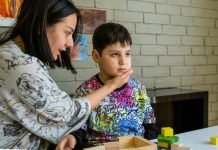
In a new study, researchers found that identical twins with autism spectrum disorder (ASD) often experience large differences in symptom severity even though they share the same DNA.
The findings suggest that identifying the causes of this variability may inform the treatment of ASD-related symptoms.
The research was conducted by a team at the Washington University School of Medicine in St. Louis.
ASD is a developmental disorder that affects how a person behaves, interacts with others and learns.
Previous studies have found that when one identical twin has ASD, chances are extremely likely that the other twin has it, too.
The team analyzed data from three previous studies comprising a total of 366 identical twin pairs with and without ASD.
The severity of autism traits and symptoms in the twins was measured by a clinician’s assessment or by parents’ ratings on a standardized questionnaire.
Some cases were diagnosed by both methods. The researchers determined a 96% chance that if one twin has ASD, the other has it, too.
However, symptom scores varied greatly between twins diagnosed with ASD. The researchers estimated that genetic factors contributed to only 9% of the cause of trait variation among these twins.
In contrast, among pairs of identical twins without ASD, the scores for traits were very similar.
The researchers do not know the reasons for differences in symptom severity, but they rule out genetic and most environmental causes because the twins share the same DNA and were raised in the same environment.
Additional studies are needed to determine the cause.
The lead author of the study is John Constantino, M.D.
The study is published in Behavior Genetics.
Copyright © 2019 Knowridge Science Report. All rights reserved.



